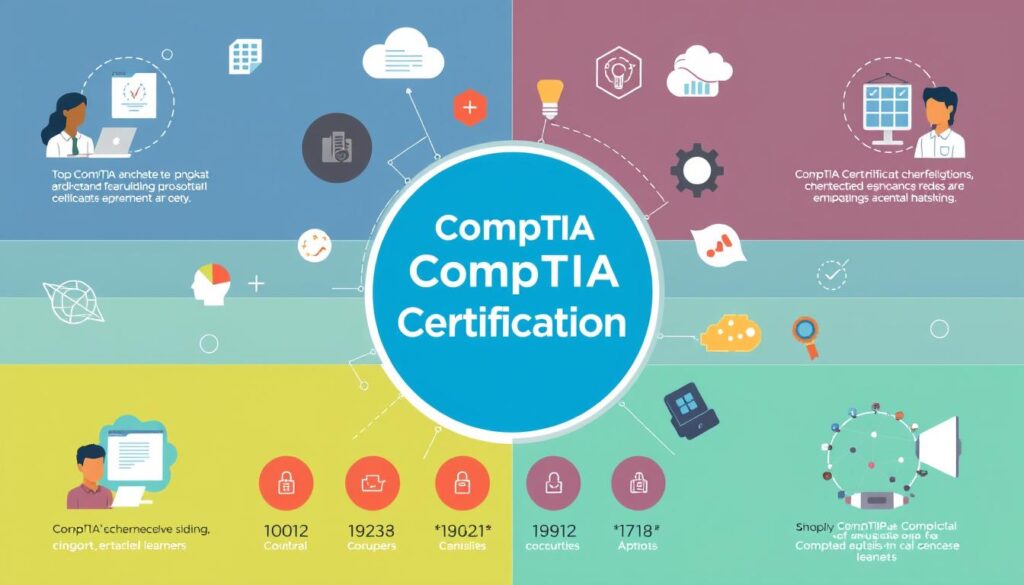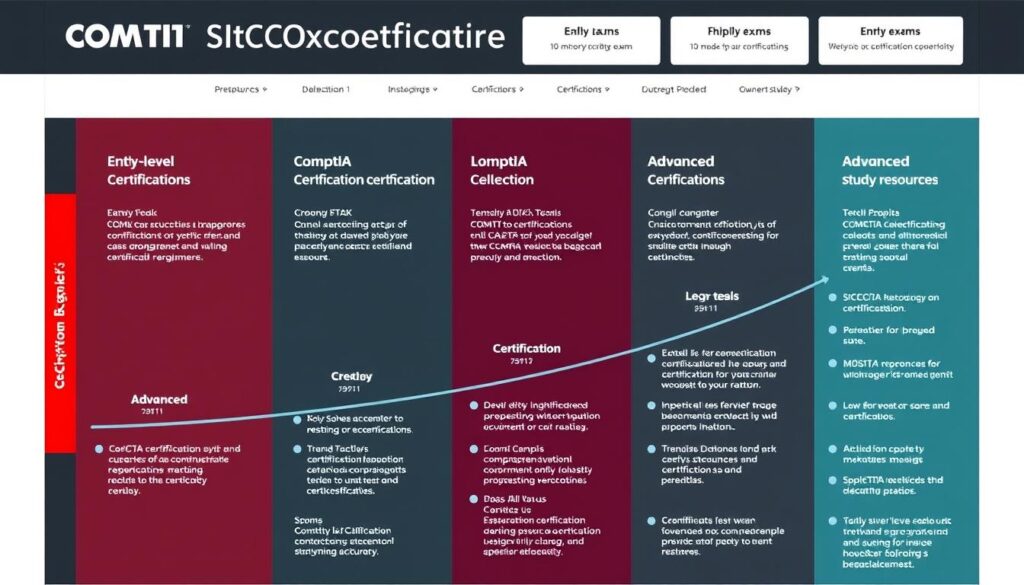You’re standing at a critical juncture in your IT career, faced with a crucial decision: whether to pursue the foundational CompTIA A+ or the specialized Security+ certification. With the IT industry evolving rapidly, the right certification can significantly impact your salary potential, job opportunities, and professional growth.
Did you know that IT professionals with certifications can earn up to 15% more than their non-certified counterparts? This statistic underscores the importance of making an informed decision about your certification path.
As you navigate this decision, understanding the key differences between CompTIA A+ and Security+ is essential. This guide will help you explore the specific focus areas, prerequisites, and curriculum of both certifications to determine which one aligns best with your career goals.
Key Takeaways
- Understand the core differences between CompTIA A+ and Security+ certifications.
- Learn how each certification impacts your career prospects and salary potential.
- Discover the specific focus areas and prerequisites for both certifications.
- Determine the best certification path based on your current skills and career goals.
- Explore the potential for professional growth with each certification.
Overview of CompTIA Certifications

CompTIA’s certification ecosystem provides valuable insights into the IT industry’s most sought-after skills. By offering a progressive path of certifications, CompTIA enables IT professionals to build upon their existing knowledge and skills. The certifications are designed to validate specific skill sets that employers actively seek in today’s competitive IT job market.
You’ll gain valuable insights into CompTIA’s certification ecosystem and how these industry-recognized credentials can significantly boost your IT career prospects. CompTIA offers a range of certifications, including A+, Network+, and Security+, each focusing on different aspects of IT, such as hardware, network fundamentals, and security measures.
The statistics show that CompTIA-certified professionals earn substantially more than their non-certified counterparts, with tech wages averaging 103% higher than the national median wage. According to CompTIA’s State of the Tech Workforce, the projected growth rate for tech jobs over the next decade is nearly twice the national jobs rate. For more detailed information on CompTIA A+ certification, you can refer to this Comprehensive Study Guide.
Understanding the relationship between these certifications will help you develop a strategic approach to your professional development and certification journey. You’ll discover how CompTIA’s “stackable certifications” concept allows you to build credentials that complement each other and demonstrate a broader range of IT competencies, including network administration and security practices.
CompTIA A+ Certification: The Foundation

The CompTIA A+ certification is a foundational credential that can significantly impact your IT career. It is designed to validate your knowledge and skills in areas such as hardware, software, networking, and security.
Focus and Curriculum
The CompTIA A+ certification curriculum covers a wide range of topics, including hardware components, network fundamentals, and security best practices. You’ll gain a comprehensive understanding of IT concepts and learn how to troubleshoot common issues.
Prerequisites and Requirements
There are no formal prerequisites for CompTIA A+ certification, making it an ideal starting point for those new to IT. However, CompTIA recommends having around 9-12 months of hands-on experience or equivalent knowledge.
Career Opportunities and Salary Potential
CompTIA A+ certification holders can pursue various entry-level IT positions, such as help desk technician, desktop support specialist, and field service technician. According to the 2023 Salary Survey by Certification Magazine, the average salary for CompTIA A+ certification holders is $108,170 in the U.S. and $99,980 worldwide.
- Boost your earning potential: A+ certified professionals can earn an average of $108,170 in the U.S.
- Stand out in a competitive job market: A+ certification demonstrates your commitment to the IT profession.
- Access entry-level IT positions: Many organizations use A+ certification as a screening tool for technical support positions.
- Plan your long-term career: Understanding the career paths that begin with A+ certification can help you develop a professional growth strategy.
- Enhance your career prospects: A+ certification is often associated with baseline or entry-level support positions, including associate network engineer roles.
CompTIA Security+ Certification: The Specialist Path

For those aiming to advance their careers in IT security, the CompTIA Security+ certification is a valuable credential. It demonstrates your ability to handle security tasks and understand security principles.
The CompTIA Security+ certification training covers a broad range of security topics, ensuring you’re well-versed in the latest security trends and practices.
Focus and Curriculum
The Security+ curriculum focuses on critical security topics, including network security, compliance, and operational security. It prepares you to identify and mitigate security risks effectively.
Prerequisites and Requirements
While there are no strict prerequisites for Security+, having CompTIA A+ or equivalent experience is recommended. This background helps you understand the foundational concepts that Security+ builds upon.
Career Opportunities and Salary Potential
With Security+, you can qualify for various roles, including security administrator, systems administrator with a security focus, and junior penetration tester. According to the U.S. Bureau of Labor Statistics, network and computer systems administrators, a category that includes many Security+ holders, earn a median annual salary of $80,600.
- You’ll discover diverse career opportunities available with a Security+ certification, including security administrator and junior penetration tester.
- The certification can qualify you for positions that fall under the BLS category of network and computer systems administrators, with a median annual salary of $80,600.
- Security+ is often required or preferred for many government positions and contractors working with federal agencies.
- Many organizations view Security+ as evidence of your commitment to cybersecurity best practices.
- Understanding the career advancement possibilities with Security+ will help you evaluate its potential return on investment.
CompTIA A+ vs. Security+: Key Differences
The choice between CompTIA A+ and Security+ certifications hinges on several key factors that can significantly impact your career trajectory. Understanding these differences is essential to making an informed decision that aligns with your career goals and current experience.
Skill Level and Complexity
CompTIA A+ is considered an entry-level certification, foundational for IT careers, focusing on general IT knowledge and skills. In contrast, CompTIA Security+ is more advanced, requiring a deeper understanding of security concepts and practices. Security+ is geared towards IT professionals with some experience, particularly those interested in cybersecurity.
Exam Content Comparison
The exam content for A+ covers a broad range of IT topics, including hardware, software, networking, and troubleshooting. Security+, on the other hand, is specialized, focusing on security topics such as risk management, vulnerabilities, and data protection. The Security+ exam assesses your ability to identify and mitigate security threats.
Career Progression Path
While A+ is a stepping stone for various IT careers, Security+ is more directly aligned with cybersecurity roles. Holding a Security+ certification can qualify you for positions with median salaries around $80,600, according to the U.S. Bureau of Labor Statistics. Moreover, it opens pathways to higher-paying cybersecurity positions.
Return on Investment
Both certifications offer significant returns, but in different ways. A+ certified professionals can earn an average of $108,170, as per recent surveys. When evaluating the ROI, consider not just the immediate salary impact but also long-term career advancement opportunities. Here’s a comparison of the potential financial returns:
- A+ certification: Average salary of $108,170
- Security+ certification: Median salary of $80,600, with potential for higher-paying roles
- Long-term career growth and advancement opportunities
The Stackable Certification Approach

The stackable certification approach offers a flexible and efficient way to build your IT skillset. By pursuing multiple CompTIA certifications, you can demonstrate your expertise and commitment to potential employers.
Benefits of Taking Both Certifications
Taking both CompTIA A+ and Security+ certifications can significantly enhance your career prospects. You’ll gain a broad understanding of IT concepts and specialized knowledge in security.
- Comprehensive Skillset: You’ll develop a wide range of skills, from hardware and networking to security protocols.
- Enhanced Career Opportunities: Many employers require or prefer candidates with multiple certifications.
Recommended Order and Timeline
Typically, IT professionals start with CompTIA A+ and then progress to Security+. The timeline between certifications varies based on experience, but most spend 3-6 months on each.
- Leverage Overlapping Content: Studying for A+ and Security+ can be more efficient due to overlapping content.
- Practical Experience: Gaining practical experience between certifications can reinforce concepts and help meet prerequisites.
NetCom Learning’s CompTIA Training Programs

NetCom Learning offers comprehensive CompTIA training programs designed to equip you with the skills needed for both A+ and Security+ certifications. Their A+ certification training provides a thorough overview of multiple operating systems, enabling you to maintain, troubleshoot, and adapt to different technology platforms.
The Security+ certification portion covers essential knowledge and skills required to identify, assess, and mitigate security risks in modern IT environments. Upon completion, you will receive an exam voucher for each certification exam.
- The A+ training program covers multiple operating systems, troubleshooting methodologies, and hardware fundamentals.
- The Security+ program focuses on identifying, assessing, and mitigating security risks.
- NetCom Learning provides exam vouchers upon completion of their training programs.
Conclusion: Choosing the Right CompTIA Certification for Your Career Goals
With a clear understanding of CompTIA A+ and Security+, you’re now poised to make an informed decision about which certification is right for you. Your career aspirations and current skill level are key factors in this decision.
If you’re new to IT, CompTIA A+ provides a foundational understanding of IT concepts, including network fundamentals. For those with IT experience looking to specialize in security, Security+ is a valuable credential.
Consider your timeline, budget, and long-term objectives when choosing between these certifications. Many professionals benefit from pursuing both in sequence, building a comprehensive skill set.
FAQ
What is the main difference between CompTIA A+ and Security+ certifications?
The main difference lies in their focus areas; CompTIA A+ is a foundational certification covering a broad range of IT topics, while Security+ is a specialist certification focusing on network security and risk management.
Are there any prerequisites for taking the CompTIA A+ or Security+ exams?
CompTIA recommends having at least nine to 12 months of hands-on experience in IT administration for A+, while Security+ requires CompTIA Network+ certification and at least two years of IT experience with a security focus.
How do CompTIA A+ and Security+ certifications impact career opportunities?
Both certifications can enhance your career prospects; A+ is ideal for entry-level IT positions, while Security+ is geared towards security-related roles, such as security specialist or network administrator with a security focus.
Can I take both CompTIA A+ and Security+ certifications?
Yes, you can take both certifications; in fact, CompTIA promotes a stackable certification approach, where you can build on your existing knowledge and skills by taking multiple certifications.
What is the recommended order for taking CompTIA A+ and Security+ certifications?
It is recommended to start with CompTIA A+ as a foundational certification, followed by Security+ to specialize in network security.
How long does it take to prepare for the CompTIA A+ and Security+ exams?
The preparation time may vary depending on your existing knowledge and experience; however, CompTIA recommends allocating at least 120 hours of study time for each certification.
What kind of training programs does NetCom Learning offer for CompTIA certifications?
NetCom Learning offers comprehensive training programs for CompTIA A+ and Security+ certifications, including instructor-led training, online courses, and self-paced study materials.
